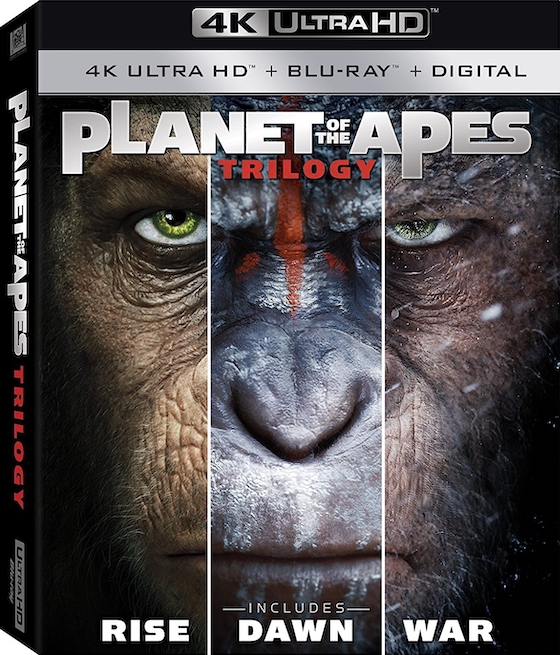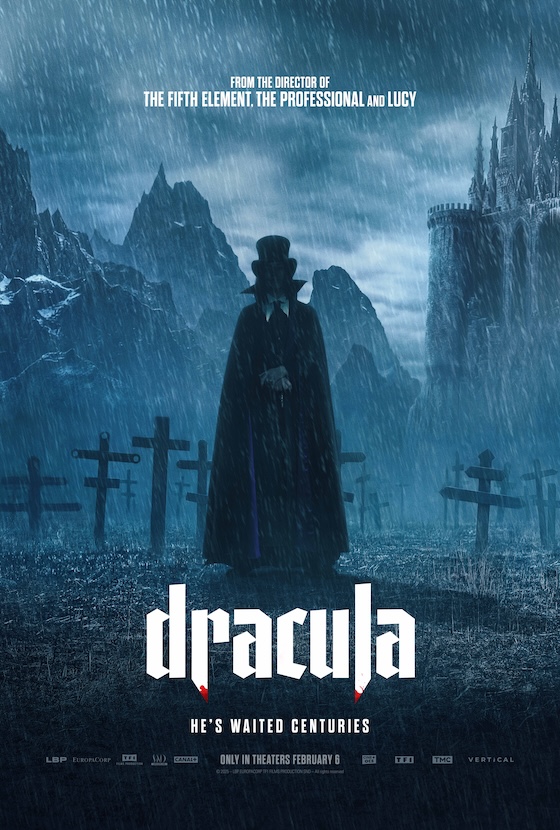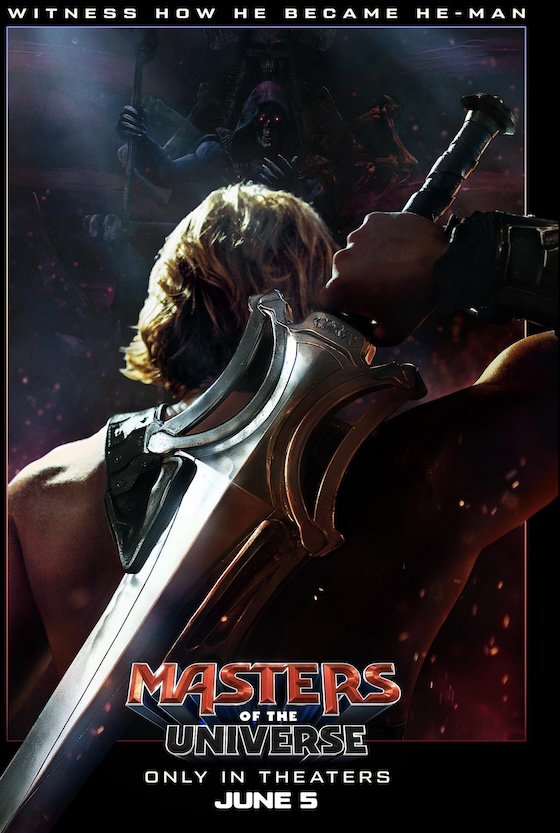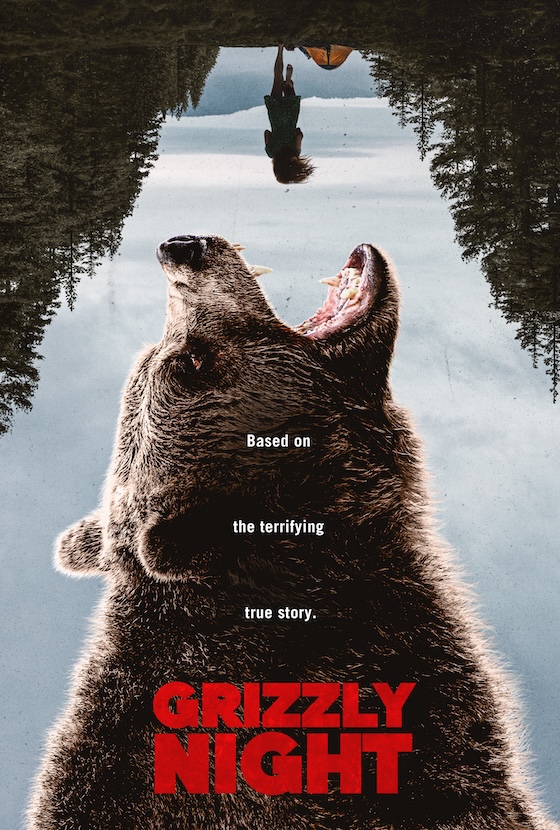Movie Review
4K UHD Review
Art
We are so spoiled for choice in this day and age that sometimes brilliance and gold that should never be missed can get left in the wake of unending wave of stuff. In a world of remakes, amazing movie magic, remakes of Planet of the Apes are not as instantly well known as Star Wars or the next Marvel movie. But they should be. Simply put, this trilogy of films in my opinion, are the finest trilogy of movies ever made. EVER. They are intelligently written. They never dip in quality or relevance. They took a notion from a series long past its used date, and made masterpieces from it. They have Oscar worthy performances, they have effects that will affect you. They are, without hyperbole, perfect.
We’re here to tell you, they shouldn’t be missed.
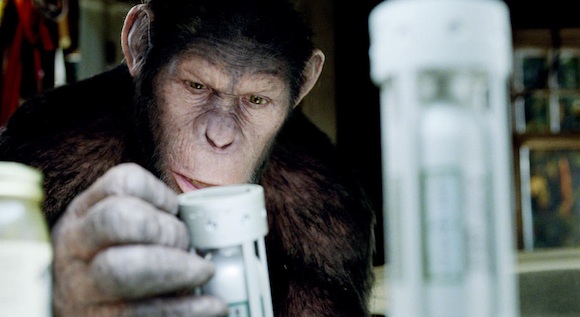
RISE OF THE PLANET OF THE APES (2011) by Christopher Symonds
In the sea of remakes, reboots, sequels that have been lathered heavily upon us in recent years, it is hard for one to remember many that have you leaving the theatre thinking it was a worthwhile endeavor. More often than not, despite the all too repetitive spin doled out by the studios, the ‘fresh approach’ given to these retellings is nothing more than new film stock and some contemporary performers—NOT fresh at all: pointless.
The Planet of the Apes series was only recently rebooted, with Tim Burton’s unpopular version at the start of the century, so it came as no surprise there was very little interest in yet another proliferation of a well mined series when it was announced. We were told this would be taking elements from the 4th Apes movie, Conquest of the Planet of the Apes, without being a direct remake—and this reviewer yawned, suspecting the same old spin. I was wrong.
In the recent tradition of Bond and Batman, this new installment is a reboot; they’re starting from scratch with a film freed from the continuity of all previous films. They do make several nods to the pre-established mythology, but never pander to them, retaining their own tone and approach consistently throughout while tipping their hats. At its core, this is a cautionary tale, in the best traditions of such stories as Frankenstein, and while it takes some elements and a rather large premise from Conquest, it has definitely put its own imprint on the story of Caesar. {googleads}
In this contemporary world, a geneticist (James Franco) tries tirelessly to develop a serum to save his ailing father from Alzheimer’s disease. When his initial trials on chimpanzees go to hell rather publically, he takes his research, including a newborn chimp (Andy Serkis), home to start anew… and succeeds. Not only does he cure his father (John Lithgow), but his chimp Caesar displays extraordinary intelligence—a genetic by product from his mother. As Caesar grows, and the geneticist’s amended attempts on more chimps and his father progresses, the seeds are sprung for Apes to rise and mankind to fall.
This is a delicately constructed narrative that builds to a rousing and satisfying conclusion. Franco is this story’s Frankenstein and Oppenheimer rolled into one; his plight and motivations are instantly sympathised with, and it is obvious what is going to happen toward the end—‘The road to hell is paved with good intentions’, comes to mind—but it is no less compelling for it.
What really makes the movie is Caesar; a completely simulated (motion capture) ape, performed by Gollum himself: Andy Serkis. The nuances of this character, as he falls in love with his surrogate father, is cruelly torn away from him, and eventually leads his kind in a revolt, is nothing short of extraordinary. Such intricacy is achieved with this character with such impressive brevity that you completely forget it is just pixels your eye can see. Serkis asserts that motion capture replicates an actor’s soul through a simulation, and without it, it would simply be a cartoon. I think he’s proven that beyond a shadow of a doubt twice now. None of the other apes register as anything less than real, either. It’s truly remarkable.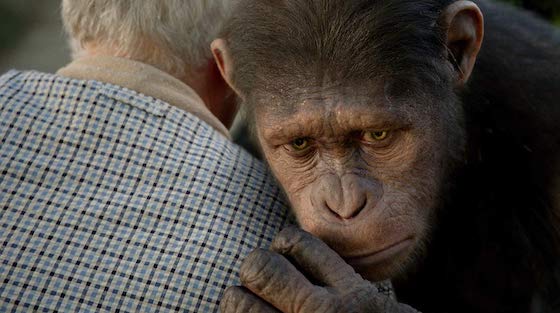
Special mention must be made to British director, Rupert Wyatt, for the flawless handling of only his SECOND movie. You wouldn’t know the guy only has one much lower budget film to his name before this. I look forward to seeing his next effort.
This is a new beginning for the Apes franchise, not one I am sure anyone wanted, but one—for once—that has earned the right to proliferate into sequels on its own merits, instead of the brand name. Not only is this one of the best tent pole films of 2011, it’s of the best genre films in years. Spectacular and unmissable, Rise of the Planet of the Apes is the best installment since 1968. Well done.

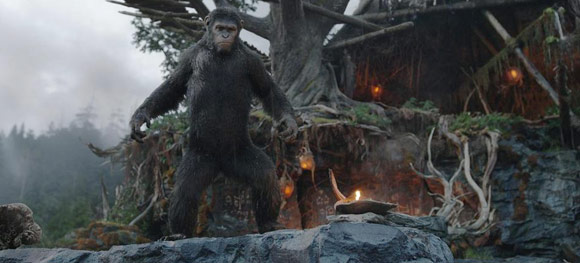 DAWN OF THE PLANET OF THE APES by Loron Hayes
DAWN OF THE PLANET OF THE APES by Loron Hayes
Finally.
Want to see an ape win an Academy Award? Look no further than Andy Serkis as Caesar in Dawn of the Planet of the Apes for the chance. He is seriously that good and the two hour movie, expanding on the brawn and greatly improving the brain of 2011’s reboot of the once madly popular five-picture and TWO television shows Planet of the Apes franchise, is equally as solid. As a middle chapter, director Matthew Reeves’ entry is darker and a bit bolder in its statement about humans and their simian counterparts as this interspecies battle rages on.
In the mythos of the narrative, it has been a decade since the apes escaped Gen-Sys labs and made their camp in Marin County. Humanity has suffered a major blow in the form of a virus that has pretty much wiped out the population; this was hinted at during the closing credits of the first picture. The surviving humans are well aware of the apes but the apes – after discovering Malcolm (Jason Clarke), Ellie (Keri Russell) and Malcolm’s son Alexander (Kodi Smit-McPhee) – are surprised that humans still exist. An uneasy truce is established once the humans come to accept that the apes can talk but tension on both sides keeps the peace in question.
Rise of the Planet of the Apes was not a favorite of mine in 2011. Sure, I could have given it a pass (and I guess I did with a 3-Reel rating) but, you see, I love the original mythology and I guess I am a bit protective when it comes to these damn and dirty apes. Rise was smart in the beginning but grew weak in the middle and weaker still as the apes began to rebel, concluding in some hokey dialogue, and cutesy nods to the original, and helicopter-based situations far too comical to be believable. I wanted better. It is my pleasure to inform you that Dawn delivers what I originally expected from the series. {googleads}
The three years gap between movies aids the new installment. Dawn of the Planet of the Apes improves upon the reboot with a strong and intelligent script by Mark Bomback, Rick Jaffa and Amanda Silver that simply flushes the bullshit. This is a driven narrative that is honest, correct, and terrifyingly true to its purpose. In fact, the trio might have studied some of the best sequels for plotting aspects in these “Gorilla” Wars and combined it with the social science found in a NatGeo documentary about two clashing cultures or one about Americans and their guns. We have durable characters spouting out believable lines and we have apes and humans jockeying for glory and power while a once captive Caesar figuratively dons a stovepipe hat and does his best Honest Abe. {googleads}
The apes – now joined by orangutans and gorillas and all other sorts of primates – simply dominate the picture. And it is quite believable. This is the first time that performance capture 3D has been successfully done in a practical environment and not merely on a cold studio’s stage. The difference is immersive and impressively stunning. Caesar’s clan has grown, organized, and quite expertly adapted to their surroundings. They don’t live in fear; they attack all manner of beast. The motion capture 3D effects are mind-bending and suggest a new bar for other FX-heavy productions to match.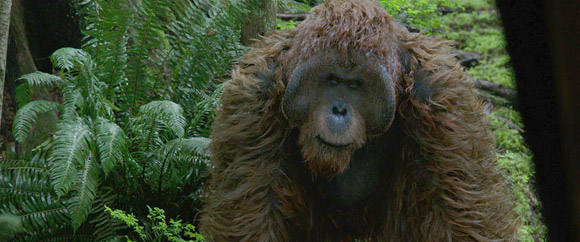 Reeves, who has flirted with a sort of Spielbergian philosophy behind the camera with Let Me In and Cloverfield, provides the film with a steady hand for energy, action, and tension without creating PTSD for the audience. Imagine that. An action film without bozos unnecessarily blowing crap up, boobs bouncing everywhere, and no Bay (as in Michael Bay). Reeves’ film is well-shot, well-choreographed, and flawless in its execution of some pretty intense scenes. Even the small scenes play out nicely. Reeves certainly has a bright future ahead of him. Fans of the series do, too. The humans in this world of apes; however, do not.
Reeves, who has flirted with a sort of Spielbergian philosophy behind the camera with Let Me In and Cloverfield, provides the film with a steady hand for energy, action, and tension without creating PTSD for the audience. Imagine that. An action film without bozos unnecessarily blowing crap up, boobs bouncing everywhere, and no Bay (as in Michael Bay). Reeves’ film is well-shot, well-choreographed, and flawless in its execution of some pretty intense scenes. Even the small scenes play out nicely. Reeves certainly has a bright future ahead of him. Fans of the series do, too. The humans in this world of apes; however, do not.
Dreyfus (Gary Oldman) and much of the rest of the race, now surrounded by that dystopian reality we all imagine our future holds, salvage what they can of their former reign but – unless their brains match their bullet supply – their time has passed swiftly away; all tools are useless it seems. They simply aren’t ready for the type of battle the apes are capable of waging. You won’t be either because, yes, the script dares to go there. Dawn of the Planet of the Apes is tense, frightening, and downright shocking in some of its images and thought processes. It’s all a bit of history repeating as apes saddle their horses and raise their guns above their heads…
With Dawn of the Planet of the Apes, you will believe that an ape can rule.

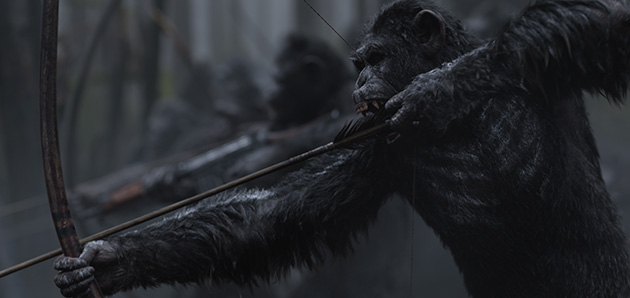 WAR FOR THE PLANET OF THE APES BY LORON HAYES
WAR FOR THE PLANET OF THE APES BY LORON HAYES
Hello, Oscars! Allow me to introduce you to your first 2017 contender for Best Picture, Best Director, and Best Actor at the next Academy Awards. War for the Planet of the Apes is THAT good.
I’m on the record for not being the biggest fan of 2011’s Rise of the Planet of the Apes. I won’t repeat what I said back then about that one, but I was also a staunch supporter of where the rebooted series went in Dawn of the Planet of the Apes in 2014. Finally, we got a bit of muck and mire on our hands. Grit was allowed to mix and blood was spattered as smaller scenes made really BIG splashes and raw emotion took over. As a fan of the original series, I was thrilled to see the series become something mightier. Thump on that chest. Raise those rifles up over your heads.
Here we are then in 2017, three years later, with yet another Planet of the Apes movie. Worry not, though, the success of the second installment was definitely not a fluke. War for the Planet of the Apes clears the fences and is, at times, better at creating that epic sense of storytelling that comes from cinematic masters of the medium like Robert Wise and David Lean than any other one of the prequels. This one definitely won’t be forgotten during Oscar season.
Director Matt Reeves (Cloverfield, Let Me In) returns to the Ape-tastic franchise for War for the Planet of the Apes and he continues to play up the small scenes that made his Dawn of the Planet of the Apes so damn impactful. Once again, he presents us with a very serious and very simian-centric tale about apes, humans, and WAR. How far would you go to protect your friends and families from the threat other beings presented? Would you bring about harm to all you loved in doing so? These are some of the questions asked and, trust me; the narrative provides no easy answers. Blame is not easily placed.
Two years after the events in Dawn of the Planet of the Apes, Caesar (Andy Serkis) and his family – including those simians still with him – feel the proverbial walls closing in on their existence. Sure, there’s a whole Moses sequence we’ve yet to see, but fear – the worst four-letter word there is – has wormed its way into their camp. The harsh truth is that their place is no longer safe, nor is it secure, and that fear – once accepted – makes for some really difficult situations. {googleads}
Even other apes – especially those seeking revenge on Caesar – are joining forces with the humans, now led by The Colonel (Woody Harrelson). His worldview is equal to that of ivory trader Kurtz from Heart of Darkness. Much of his dialogue is in terms of black and white. There are no shades; it either is or it isn't. And the world, as he sees it, is best when humans ARE the on top. He is obsessed with making sure that humans remain the dominant species and delivers his "exterminate all the brutes" machismo without nary a wink or a nudge.
But, as the film points out, even he and his paramilitary operation have reason enough for such rhetoric and soon Caesar feels tremendous loss where it hurts the most. And we weep for both sides of this world.
With nods to Vietnam and now-classic films about war, War for the Planet of the Apes is both compelling and intelligent. It is also fully aware of itself and what it needs to do as the final piece of Caesar’s legacy. There are a handful of humorous moments, mainly courtesy of Steve Zahn as Bad Ape, but this is an insanely honest portrait of the ravages of war that many - maybe even not fans of the series - will definitely be able to relate to.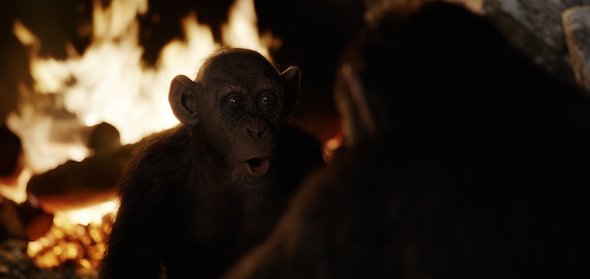
Moody and dark, the new installment is a soulful success. It also extends Reeves’ work on Dawn thanks to the returning lens of cinematographer Michael Seresin. Once again, we have a conflict that is supported more by strong characters with real emotions than by villains with bigger guns. While the central conflict indeed grows and grows and both sides face HUGE losses, the characters and their emotions match these extensions of the story, resulting in a movie that is insanely expressive and effective in creating visceral responses in its audience.
The movie also features some of the best ape effects we’ve ever seen. WETA has outdone itself with effects so real all we can concentrate on are, as it should be, the rich performances. Remember that gamey sequence as Caesar runs up to the attic in the original? It’s been dumped. Long gone. The sequences here are beyond photo-realistic. Regardless of the environment (snow, desert, woods), they are indeed damn impressive. Also extraordinary is Serkis and his stirring performance. Surely, an award or two or three can’t be too far away...
The Apecalypse is NOW.

![]()
4K UHD Details:
Rise of the Planet of the Apes (2011)
Home Video Distributor: 20th Century Fox
Available on Blu-ray - October 24, 2017
Screen Formats: 2.40:1
Subtitles: English SDH, French, German, Italian, Spanish, Cantonese, Danish, Dutch, Finnish, Mandarin, Norwegian, Swedish
Audio: English: English: DTS-HD Master Audio 5.1; Spanish: Dolby Digital 5.1; French: DTS 5.1; Spanish: DTS 5.1; German: DTS 5.1; Italian: DTS 5.1
Discs: 4K Ultra HD; Blu-ray Disc; Six-disc set
Region Encoding: 4K Blu-ray: Region free; 2K Blu-ray: Region A
VIDEO:
Rise was shot on 35mm film stock back in the day, so it’s a shame that this is a 2K scan upscale; having said that, it is a beautiful looking picture and, with the HDR, gets a slight uptick for presentation. What you can notice is improved color, especially in the skin tones of the actors and the CGI apes. Greens of the forest scenes and neighborhood streets also get a major shot in the arm. The contrast is improved. Blacks are solid and highlights compliment adequately. The state of the art technology at the time is showing its infancy. The compositing of Caesar and the other apes in certain scenes to the live action elements show their vintage (which is no way bad, but has improved by leaps and bounds).
AUDIO:
This is the same 5.1 DTS-HD lossless mix from before. It was awesome back when it was first released, so is awesome now. Action scenes and the score successfully approximate immersion, directionality and heavy base. Dialogue is clean and centre heavy. Would have liked to see an Atmos mix for this, along with a native scan of the movie, but not this time around
4/5
FEATURES:
3/5
Supplements:
Special Features:
Oh, how my broken record keeps spinning. It’s nothing but reused commentaries on the 4K disc and the Blu-ray features on the Blu-ray disc from the previous release (which is included), along with a digital copy.
Blu-ray Rating:
| Movie |  |
|
| Video |  |
|
| Audio |  |
|
| Extras |  |
|
|
Overall Blu-ray Experience
|
||
{googleads}

![]()
Blu-ray Details:
Dawn of the Planet of the Apes (2014)
Home Video Distributor: 20th Century Fox
Available on Blu-ray - October 24, 2017
Screen Formats: 2.35:1
Subtitles: English SDH, French, German, Italian, Spanish, Cantonese, Danish, Dutch, Finnish, Mandarin (Simplified), Norwegian, Swedish
Audio: English: DTS-HD Master Audio 7.1; Spanish: Dolby Digital 5.1; French: DTS 5.1; Spanish: DTS 5.1; German: DTS 5.1; Italian: DTS 5.1
Discs: 4K Ultra HD; Blu-ray Disc; Six-disc set
Region Encoding: 4K Blu-ray: Region free; 2K Blu-ray: Region A
VIDEO:
Okay, Dawn was shot digitally. The 2K picture is more stylized and a darker presentation that the first movie. This 4K upscale as a result brings really no new detail. What it does bring is HDR, which does bolster the many dark scenes, given real depth in the blacks of a scene. Explosions, fires, etc, had the expected HDR boost as well. There is some dimension and depth added to the picture, and due to the advances in compositing and CGI in the motion capture, this ironically presents a more unified picture in total. HDR is really the only reason to upgrade.
AUDIO:
This may not be ATMOS or DTS-X, but the 7.1 DTS-HD master from the previous release could sure fool you into thinking it was. It may not be anything new, but falls into the category of it ain’t broke don’t fix it. It’s gloriously layered in all channels, with spears and gun sounds whisking past your ears. Ambience and subtlety is boundless. A true masterful mix that I never tire of listening to.
Supplements:
Special Features:
Oh, how my broken record keeps spinning. It’s nothing but reused commentaries on the 4K disc and the Blu-ray features on the Blu-ray disc from the previous release (which is included), along with a digital copy.
Blu-ray Rating:
| Movie |  |
|
| Video |  |
|
| Audio |  |
|
| Extras |  |
|
|
Overall Blu-ray Experience
|
||
{googleads}

![]()
Blu-ray Details:
War For the Planet of the Apes (2017)
Home Video Distributor: 20th Century Fox
Available on Blu-ray - October 24, 2017
Screen Formats: 2.35:1
Subtitles: English SDH, French, German, Italian, Spanish, Cantonese, Czech, Danish, Dutch, Finnish, Mandarin (Simplified), Norwegian, Polish, Swedish
Audio: English: Dolby Atmos; English: Dolby TrueHD 7.1; Spanish: Dolby Digital 5.1; French: DTS 5.1; Spanish: DTS 5.1; German: DTS 5.1; Italian: DTS 5.1; Czech: Dolby Digital 5.1; Polish: Dolby Digital 5.1; Japanese: DTS 5.1
Discs: 4K Ultra HD; Blu-ray Disc; Six-disc set
Region Encoding: 4K Blu-ray: Region free; 2K Blu-ray: Region A
VIDEO:
This is darkest chapter of the trilogy, as much visually as it is narratively. As a result, the palette of this picture doesn’t lend itself to many eye popping color filled scenes. What it does give you is more detail in shadows and blacks, especially the hairs on the apes. The final scene of the picture was beautifully rendered in color and leapt off my screen. HDR lends itself more to the green spectrum this time, but the 2K upscale is dour by choice, so while not a demo disc by any stretch, it’s a solid presentation of what was intended.
AUDIO:
This is the only one of three, given an ATMOS 7.1 mix. Handles heart thumping action and pensive emotional moments with equal aplomb. Its’ detail and layers work the speakers well, and completely immerse you in the film. Perfection incarnate.
Supplements:
Special Features:
Oh, how my broken record keeps spinning. It’s nothing but reused commentaries on the 4K disc and the Blu-ray features on the Blu-ray disc from the previous release (which is included), along with a digital copy.
Blu-ray Rating:
| Movie |  |
|
| Video |  |
|
| Audio |  |
|
| Extras |  |
|
|
Overall Blu-ray Experience
|
||
{googleads}
